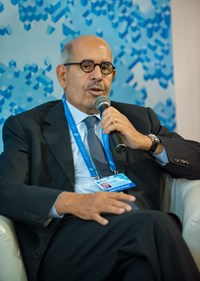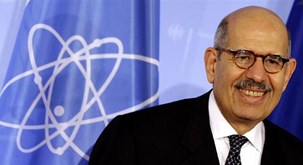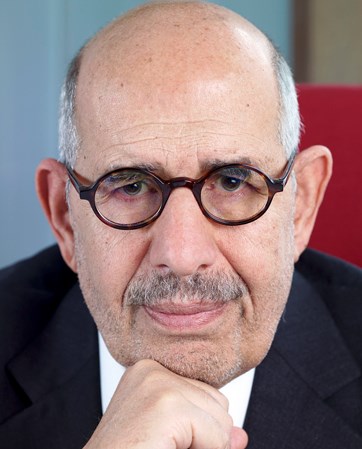Speakers By Topic

Speakers By Type




"{{ovation.quote}}"
-{{ovation.company}}Nuclear Technology in a Changing World
Living in the nuclear age, the global community is rapidly approaching a crossroads. The benefits of nuclear energy and other nuclear technologies are needed more than ever, but nuclear weapons and nuclear terrorism pose a serious security threat to humanity. Will this technology continue to be harnessed as a servant to development or will we become the victims of its destructive power? Nobel Peace Laureate DR. MOHAMED ELBARADEI believes the stage is set for change to maximize the benefit and minimize the risk. He considers why the future of nuclear technology will depend not only on continued technological innovation but also on vision, leadership and international cooperation for a new nuclear order.
Preventing a Nuclear Nightmare
As world powers condemn Iran over its nuclear program and demand that Iran freeze nuclear activities, DR. MOHAMED ELBARADEI knows firsthand how difficult the path ahead will be in ensuring nuclear energy is not misused for destruction. Iraq, Iran, North Korea, Libya and Syria are all sobering reminders of how fragile the global security system is and of the need for a new equitable and inclusive paradigm of international cooperation. Drawing on his experience with high-stakes negotiations, Dr. ElBaradei discusses global security and the road map for the path to peace.
The Road to a Durable Peace
The current global system is marred by inequality and insecurity and DR. MOHAMED ELBARADEI believes it is not sustainable. He sees the inextricable linkage between under-development, inequity and insecurity and believes a change of mindset is vital if we are to save ourselves from self-destruction.
Egypt and the Arab Spring Countries: Lessons Learned and Future Prospects
DR. MOHAMED ELBARADEI has been a leading figure in Egypt's march towards democracy and was a resounding voice for change during the historic events that transpired in the streets of Cairo. In this presentation he recounts the confluence of events that led to the uprising in Egypt and the rest of Arab Spring Countries, and lays forth his vision for their future. This is an opportunity for your audience to learn from a visionary leader and hear a first-hand account of the challenges people face in their quest for human dignity and democracy.
Speaker Spotlight: Mohamed ElBaradei
Nobel peace Prize Laureate and Former Vice President of Egypt DR. MOHAMED ELBARADEI is a leading voice on geopolitics and global security. The Director General Emeritus of the International Atomic Energy Agency (IAEA), Elbaradei is a renowned advocate for peace, freedom and democracy in the Arab World. He and the IAEA were jointly awarded the Nobel Peace Prize "for their efforts to prevent nuclear energy from being used for military purposes and to ensure that nuclear energy for peaceful purposes is used in the safest possible way." The Norwegian Nobel Committee referred to Dr. ElBaradei as an "unafraid advocate" of new measures to strengthen the nuclear non-proliferation regime. Dr. ElBaradei also played a leadership role in the Arab Spring of 2011 and assumed the responsibility of Interim Vice President of Egypt in 2013, following the mass country wide protests which led to the removal of President Morsi.
In his compelling, eye-opening remarks, Dr. ElBaradei sheds light on top global security and political issues, such as the role of nuclear technology in a changing world, the road to durable global peace, and the future of the Arab world. He has spoken everywhere from the World Economic Forum, to Google Zeitgeist, to Yale University. He receives rave reviews such as: "Excellent session! The audience was very engaged. He is such an amazing intellect yet so approachable." (Thompson Reuters); "The afternoon lecture audience was 1,400 and he received a standing ovation. At dinner for 350 people – another standing ovation. An absolute pleasure to work with him." (University of Utah)
Watch some of Mohamed ElBaradei's talks here > >
Dr. Mohamed ElBaradei was Director General of the International Atomic Energy
Agency (IAEA) from December 1997 until November 2009. He joined the IAEA in 1984 where he held a number of positions including Legal Adviser and Assistant Director General for External Relations. Dr. ElBaradei is currently Director General Emeritus of the IAEA.
Dr. ElBaradei was born in Cairo, Egypt, in 1942, son of Aida Hegazi and the late Mostafa ElBaradei, a lawyer and former President of the Egyptian Bar Association. He gained a Bachelor’s degree in Law in 1962 at the University of Cairo, and a Doctorate in International Law at New York University School of Law in 1974.
He began his career in the Egyptian Diplomatic Service in 1964, serving in the Permanent Missions of Egypt to the United Nations in New York and Geneva. During his career, Dr. ElBaradei participated in the policy and legal activities of many international and regional organizations including: the United Nations General Assembly, the United Nations Security Council, the Conference on Disarmament, the International Labor Organization, the World Health Organization and the Commission on Human Rights.
From 1974 to 1978 Dr. ElBaradei was a special assistant and legal advisor to the Foreign Minister of Egypt. In 1980, he left the Egyptian Diplomatic Service to join the United Nations. From 1980 to 1984, he was a senior fellow responsible for the International Law Program at the United Nations Institute for Training and Research. From 1981 to 1987, he was also an Adjunct Professor of International Law at the New York University School of Law.
Dr. ElBaradei has lectured widely in the fields of international law, international organizations, global equity and security, arms control, democratic transition and human rights. He is the author of various books and articles on these subjects.
In October 2005, Dr. ElBaradei and the IAEA were jointly awarded the Nobel Peace Prize "for their efforts to prevent nuclear energy from being used for military purposes and to ensure that nuclear energy for peaceful purposes is used in the safest possible way." In its citation, the Norwegian Nobel Committee referred to Dr. ElBaradei as an "unafraid advocate" of new measures to strengthen the nuclear non-proliferation regime.
Dr. ElBaradei is an adjunct professor of Law at Cairo University School of Law and has been a board member of many organizations including: The Global Citizenship Commission; Transparency International; the International Crisis Group; the Coalition of Dialogue on Africa; the Global Economic Symposium; the American University in Cairo; the United Nations High Level Commission on HIV Prevention; The Cairo Regional Center for International Commercial Arbitration (CRCICA); International Luxemburg Forum on Preventing Nuclear Catastrophe; Global Leadership Foundation (GLF) In 2014 he was Laureate in Residence at Fletcher School for Law and Diplomacy.
Dr. ElBaradei is an advocate for peace, freedom and democracy in the Arab World. He played a leadership role in the Arab Spring of 2011 and assumed the responsibility of Interim Vice President of Egypt in 2013, following the mass country wide protests which led to the removal of President Morsi. Dr. ElBaradei resigned as Interim Vice President shortly after his appointment in protest over the use of violence against the supporters of the deposed president.
Dr. ElBaradei has received numerous other awards for his work as a public servant and as an advocate of tolerance, humanity and freedom. These include: Franklin D. Roosevelt Four Freedoms Medal; Georgetown University Raymond "Jit" Trainor Award for distinction in the conduct of diplomacy; Dortmund "Der Steiger Award for Tolerance"; Muslim Public Affairs Council (MPAC) Human Security Award; "Keys of the City" of Bari and Florence, Italy and Montevideo, Uruguay and “Distinguished Visitor” of La Paz, Bolivia and Quito, Ecuador; Honorary Patron of the Philosophical Society, Trinity College, University of Dublin; "Golden Dove of Peace" prize from the President of Italy; "Atoms for Peace" prize by the International Institute for Sustainable Peace (IISP) and the World Council of Nuclear Workers (WONUC); World Nuclear Association award; "Peacebuilding Award" of the East West Institute; International Seville NODO Prize for Peace, Security and Inter-Cultural Dialogue; Indira Gandhi Prize for Peace, Disarmament and Development and “Prize for Statesmanship”; Friends of Europe, Brussels.
Dr. ElBaradei is the recipient of honoris causa degrees from New York University, the University of Maryland, the American University in Cairo, the Free Mediterranean University (LUM), Bari, Soka University of Japan, Tsinghua University, Beijing, the Polytechnic University of Bucharest, the Universidad Politécnica de Madrid, Konkuk University, Seoul, the University of Florence, the University of Buenos Aires, the National University of Cuyo, Argentina, Amherst, College, Cairo University, and the University of Dublin, Trinity College.
Dr. ElBaradei is married to Aida El Kashef, a retired early childhood teacher. They have a daughter, Laila, a lawyer, married to Neil Pizey, an investment banker - who live in London - and a son, Mostafa, an IT manager, who lives in Istanbul. They have two granddaughters: Maya and Nina.